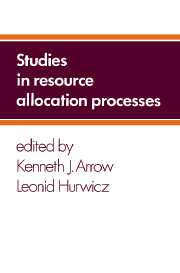Book contents
- Frontmatter
- Contents
- Preface
- Acknowledgments for reprinted articles
- PART I General introduction
- PART II Economies with a single maximand
- PART III Economies with multiple objectives
- PART IV General characterizations of allocation processes
- Appendix: An optimality criterion for decision-making under ignorance
- Author index
- Subject index
- Index of examples
Preface
Published online by Cambridge University Press: 04 April 2011
- Frontmatter
- Contents
- Preface
- Acknowledgments for reprinted articles
- PART I General introduction
- PART II Economies with a single maximand
- PART III Economies with multiple objectives
- PART IV General characterizations of allocation processes
- Appendix: An optimality criterion for decision-making under ignorance
- Author index
- Subject index
- Index of examples
Summary
This book draws together a long series of papers by the two senior authors, alone and in collaboration with each other and with other friends and colleagues, to whose thinking and stimulation we are grateful. Both of us have had a strong primary concern with the workings of the economic system as a mechanism for achieving the optimal allocation of resources. The theme is of course an old one in economic thought; its importance was especially reinforced to us through our teachers, Harold Hotelling and Oskar Lange, and our colleague, Jacob Marschak. The very concept of optimization with resource constraints links the theory with the classical mathematical theory of constrained optimization and the more modern versions of so-called mathematical programming, where emphasis has been placed on inequality constraints.
The important property of the market as a resource allocation mechanism is its decentralization. It has always been assumed in the mainstream of economic theory, though frequently only implicitly, that the transmission of detailed information about tastes or technology is costly and that there is a virtue to systems in which decisions are made at the point where the information already existed. This desire for decentralization has, however, to be reconciled with the need for balance in the economy as a whole, most especially, in the need to respect limitations on the overall availability of resources. The mathematical characterizations of constrained optima, at least in the Lagrangian formulation and its generalizations, suggests the possibility of decentralization.
- Type
- Chapter
- Information
- Studies in Resource Allocation Processes , pp. ix - xiiPublisher: Cambridge University PressPrint publication year: 1977



